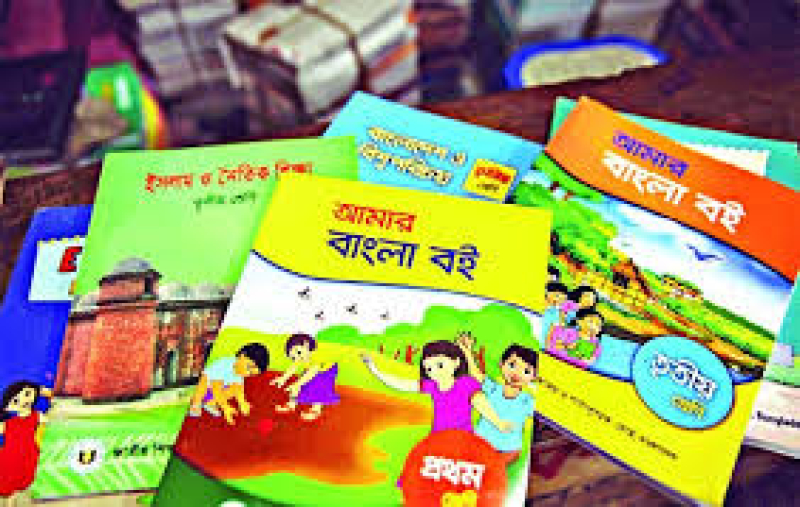- Body of Osman Hadi Returns to Dhaka From Singapore Late |
- Fakhrul condemns attacks on media, calls for unity, justice |
- 2 cops among 4 hurt in clash outside Indian Assit H.C. in Ctg |
- Inqilab Moncho urges people to avoid violence |
- Hadi’s death: Prothom Alo, Daily Star offices set afire |
Books of new curriculum in the press

Moreover, 200,000 textbooks will be given to 85,000 students of ethnic minorities, and 27 million textbooks to 3.39 million Ibtedai students.
Printing of some of the books under the new curriculum has begun, while those under the previous curriculum are almost at the final stage.
As a result, all students of the new and old curriculum will receive these textbooks at the beginning of the new year.
According to sources, social science and science books from classes VIII and IX of the new curriculum were kept out of print to avoid controversy due to political reasons. Recently, after further scrutiny of the texts, the books have again been sent to the press.
According to the National Curriculum and Textbook Board (NCTB), printing was stopped to prevent the spread of rumours and misinformation ahead of the January 7 national election.
The contents of social science books for classes VI and VII came under huge criticism regarding a chapter with Darwin's theory of evolution in it. There was no problem with that content, though. Besides, tenders were invited late for the printing of textbooks for class IX. The Education Ministry came up with a clear clarification over the issue and said that false information was being spread. All these had delayed the printing of the books for class IX.
Moreover, there were criticisms over the class VI science inquiry lesson and science practical lesson, the seventh-grade science inquiry lesson, and the science practical lesson book. Due to this, the printing of history and social science, science inquiry text, and science practical lesson books for the 2024 academic year and science inquiry lesson and science practical text books for classes 9 and 10 was stopped. Moreover, the NCTB announced the withdrawal of the history and social science book called Onushiloni Path for classes VI and VII and the science book called Onusandhani Path for class VII. Therefore, the printing of Onusandhani Path, Onushiloni Path, social science, and history books for class VIII of the new season was delayed. Similarly, the printing of Onusandhani Path and Onushiloni Path books for classes IX and X was also delayed.
When asked, NCTB (Curriculum) Member Professor Md Mashiuzzaman said: "Almost all the books of classes VI and VII of the new curriculum have been sent to the upazila level already. Books from class VIII were given to the press last Tuesday (December 12). And I gave a science book from class IX to the press last Saturday (December 16). Another book on social science and science will go to press on Monday (yesterday). The tender for printing the ninth-grade books has been late.”
He said that the first day of the year is Textbook Festival Day, and on that day, books will be ready for distribution. The books, which will be printed later, will also reach the educational institutions by January 10. As a result, by the time students get admission to the new classes, their books will be ready and available to them.
According to NCTB, the work of admitting all students and distributing books can be completed by January 15. Preparations have been made so that this procedure does not extend till February. The NCTB said classes will begin on time. However, all educational institutions will remain closed on election day and a couple of days before and after the election. Apart from this, book distribution will continue from the first day of the year till January 15 in a festive atmosphere.
Bangladesh entered a new era of education in 2023, when students were introduced to a new curriculum with a focus on competency-based learning. The entire curriculum is designed to assist the students in acquiring knowledge through experience. It has also changed the traditional evaluation system.
In 2023, the full implementation of the new curriculum began in classes I, VI, and VII of primary and secondary schools. In 2024, classes II, III, VIII, and IX will come under the new curriculum. Next year, classes IV and V of the primary schools will be introduced to the new curriculum. Class XI of the Higher Secondary will come under the new curriculum in 2026, and class XII in 2027.
The previous change in the national curriculum was made in 2012, and the implementation started in 2013. Before this, minor modifications were made to the curriculum at various times. However, this time, not an entire curriculum has been changed to transform education.
In the academic year 2024, more than 300 million textbooks and teacher's guides will be distributed among 38.1 million students and teachers. Out of this, 6.19 million books will be given to 3.3 million students at the pre-primary level. Another 87 million textbooks will be given to 18.2 million students from first to fifth grade.
Moreover, 200,000 textbooks will be given to 85,000 students of ethnic minorities, and 27 million textbooks to 3.39 million Ibtedai students.
According to sources, 132.3 million textbooks will be given to 14 million students from sixth to ninth grade at the secondary level. Also, 45 million textbooks will be distributed among 2.4 million students from sixth to ninth grade.
On the other hand, 1.1 million textbooks will be given to 170,000 students from sixth to ninth grade in the English version.
Nearly 3.5 million textbooks will be distributed among 250,000 students for technical trades and 179,000 books to 6,000 students in SSC Vocational. Besides, 728 books are to be given to visually impaired students, while teachers will get 4.1 million guidebooks.

